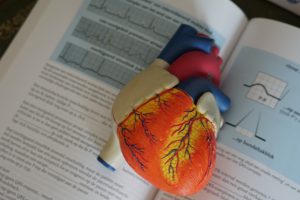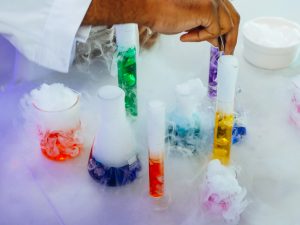
(Unsplash – Unseen Studio)
It’s nearing the end of Secondary 2 and you will have to choose which science subject to further study for the rest of your secondary school life.
At this point, it may feel extremely daunting, and you may only have a vague idea of what each of the main 3 science subjects—Biology, Physics, and Chemistry, are.
So, how do you make the decision? Let’s take a deeper look at each of them and see which science is the best option!
Physics

(Pexels – Pixabay)
Physics, the branch of science that you and your friends will probably link to math equations the most.
The goal of Physics is actually to study how several things, such as matter, energy, and anything else in the physical world, work.
Anything that happens around you, such as you switching off your bedroom light and running during physical education lessons all involves Physics.
Of course, this is just a simpler definition. The subject encompasses a whole range of laws and principles, even including radioactivity and pressure.
If you are interested in learning more about those, then Physics may be one of the sciences for you!
The Positives

(Pexels – Brett Sayles)
As mentioned above, Physics involves a lot of equations and solving problems. So if Mathematics is your strong suit, you will have an upper hand in studying Physics. It is also more straightforward, and there’s usually only one answer to a problem.
There’s also less memorisation involved as it relies more on your logical thinking and understanding of how something works along with the equations.
Physics helps you understand what and how certain things are happening in your life, which will in turn help you better understand the topics taught.
For example, you may use what you have learned from Newton’s laws of motion to understand how things fall.
Additionally, doing experiments in Physics will not be dangerous as most of the time it is just simple stuff such as connecting light switches or measuring the weight of different balls.
The Negatives

(Pexels – CVSV)
The content can be a bit dry and boring to study.
Of course, this applies to any subject that you don’t understand or dislike. However, there are really a lot of calculations and equations to be ingrained in your memory.
You would also still have to memorise the theory, as you may be tested on random topics. Although, this may not be a problem for you if you are already very interested in Physics itself or can find ways to get over the dullness.
Additionally, it may be hard to understand certain topics at first as they may not make sense. However, as long as you continuously study and practise your equations, you will understand and be enlightened by what you have learned.
With that being said, you will really need to understand the topics you learn because if you don’t, you won’t know what to apply to solve the problems.
Whereas for Biology and Chemistry, just a bit more memorisation can help you solve them if you really do not understand.
Biology

(Pexels – Leonardo Jarro)
Biology, the branch of science that you and your friends may link to lots and lots of memorisation.
It is the study of living organisms and the processes that go on in them. It provides answers to questions such as “How was I born?”, “Why are most plants green?” and so on.
You will have a deeper understanding of life and may even feel more connected to other living species.
If you are interested in learning more about those, then Biology may be one of the sciences for you!
The Positives

(Pexels – Arunodhai V)
Out of the three science subjects, Biology ranks in second place in terms of direct application to our daily lives, just a bit below Physics. It is also easy to relate to certain topics in this subject, especially those involving the human body.
You will be able to make decisions that can directly influence your lifestyle. For example, after understanding how digestion and excretion occur, it may be easier to pinpoint the main causes when you have problems with them.
Biology also provides interesting insights and helps you discover many things you didn’t know about yourself and other living things. Now you can have some interesting facts on hand to share with your friends after each lesson!
In experiments, you will get very hands-on with parts of living organisms and even food.
You may be required to dissect parts of a living thing in order to better visualise and understand it.
A common experiment would be cutting potato pieces to study osmosis. Another common experiment would be handling plants and adjusting light conditions in order to study chlorophyll.
The Negatives

(Unsplash – Robina Weermeijer)
There really will be a lot of memorisation involved, so do be prepared for it if you are planning to take Biology.
Although the content itself may be interesting, the opposite effect can happen to some students, as they feel it is not fun to take in and ‘vomit’ out a lot of information at once when answering questions.
If you don’t understand how a certain part of the process works, you would need to revise the whole process and link everything step by step in order to better understand.
Therefore, it can take longer for students to understand and memorise certain topics.
Chemistry

(Pexels – Chokniti Khongchum)
Chemistry, the branch of science that we often associate with mad scientists and experiments.
It is the study of matter and the structure and properties of different elements and compounds.
It is also the study of what happens when different elements mix together and the changes they undergo in different environments or conditions. Chemistry involves anything and everything around us, even our five senses.
If you are interested in learning more about those, then Chemistry may be one of the sciences for you!
The Positives

(Pexels – RF._.studio)
Conducting experiments is one of the best parts of Chemistry, as it is very fun and involves various chemicals to mix around with. You will be able to really experiment and watch different kinds of reactions, such as chemicals combusting or changing colour.
The best part is that you can even conduct these experiments in the comfort of your own home, but with safer and more common everyday materials, of course!
Studying Chemistry really helps you understand how the world works and the different processes that occur in our daily lives, such as breathing and even eating.
It can even enhance your cooking skills after you understand the chemical reactions during the cooking processes as you come up with different textures and mixtures of food!
By understanding the different elements and what happens when they mix or are in different conditions, you can also be safer and avoid potentially dangerous factors in your everyday life.
You will also better understand the environment around you and the impacts of problems that are present, such as pollution. You can basically contribute to saving the earth just by learning Chemistry and coming up with solutions!
As Chemistry is all about understanding concepts and brainstorming, it hones your critical and creative thinking skills, which can also help in other areas of your life.
The Negatives

(Pexels – Kindel Media)
On the other hand, conducting Chemistry experiments can be quite dangerous. There are several hazardous and sharp tools involved, such as toxic chemicals and gases.
You would also need to use a Bunsen burner for almost every single experiment you conduct in school, which also increases the chances of a fire or burning your hands if you are not careful.
Additionally, learning Chemistry and its elements automatically means that you will need to learn the periodic table of elements. Although it is usually provided in most tests and exams, you would still need to memorise a lot of processes involving those elements.
There are also a lot of abstract concepts, which can be difficult to understand. This is especially true for students who find it hard to visualise atoms and molecular structures.
And unlike Physics and Biology, it is harder to visualise and apply to our daily lives.
Conclusion

(Pexels – Ann H)
As you can tell by now, there are so many overlaps in the subject of science itself. Each science also covers different parts of life.
Thus, there is no definite answer to which science takes reign. It really all depends on what you are really interested in learning more about.
I hope this has helped you make a more informed choice about which science to further your studies in!
